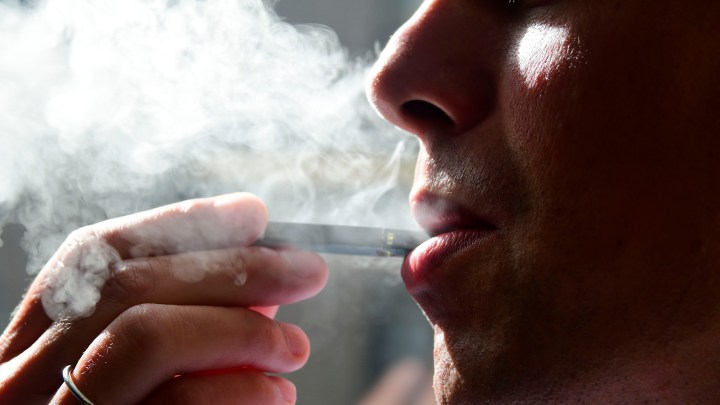
Juul struggles to secure research on the effects vaping has on health
Juul struggles to secure research on the effects vaping has on health

Vaping is under fire. Doctors and health officials are investigating hundreds of cases of lung illness linked to it; New York is moving to ban flavored e-cigarettes; and the Federal Trade Commission is investigating whether e-cigarette leader, Juul, engaged in “deceptive marketing” to teens.
With each development, Juul’s need for scientific research into the health effects of its products increases. But the vaping giant has had difficulty finding scientists to take on that research, and the few who have accepted Juul’s overtures face blowback.
Scientists around the country have reported being approached formally and informally by Juul Labs. Professor Stan Glantz, a tobacco control expert at the University of California San Francisco, is one of them, but he says he would never even consider it.
“Well, the pitch is, you know: ‘We’re a revolutionary new company, and we’re trying to reduce the harm of smoking, and we need researchers. Are you interested in working with us? And we have loads of money,’” said Glantz.
“No, I mean, I know the history here,” he said. “I’ve written a book about the history, about how the tobacco industry manipulates science.”
Juul doesn’t sell tobacco, but late last year it became part of the tobacco industry when Altria, the maker of Marlboro, purchased a 35% stake in the company for nearly $13 billion.
This summer, Juul did announce its first university research partner. Meharry Medical College, a historically black institution in Nashville, Tennessee, accepted a grant of $7.5 million from Juul Labs — the second largest research grant in the school’s history.
Senior vice president for institutional advancement at Meharry, Patrick Johnson, says he sees it as a rare opportunity for African American scientists to lead research on a swift-moving societal phenomenon.
“We have always, or traditionally, been at the back end of those experiments,” Johnson said. “It is important that we have been called to be at the forefront of this research, not on the back end.”
He says that the grant contract provides that the research will remain absolutely independent, with no input from Juul about what is studied or published. But the school began taking heat almost immediately.
“We knew that it was a leap of faith. We knew that there would be detractors,” Johnson said. The questioning came from national public health leaders, black activists and local health officials.
“I just want to say that if you put lipstick on a pig, it’s still a pig,” said Nashville tobacco prevention coordinator Lillian Maddox-Whitehead at a recent meeting organized by black public health activists on Meharry’s campus.

To date, vaping has generally been seen as popular among white teens. But in her audits of corner stores, Maddox-Whitehead says she’s seen vaping companies pushing their products in black neighborhoods. She fears a repeat of how cigarette companies pushed menthols to African Americans.
“I would just encourage people to realize that this is a problem, and it will become one in our community. It may not be a problem now, but I do see it coming,” she said.
At the event, some public health advocates called on Meharry to consider giving Juul’s money back. But third-year dental student Corinthia Wilkerson did not share that position.
“Why is there so much resistance towards Meharry for wanting to be leaders at the forefront of this research?” she asked.
Juul turned down “Marketplace” for an interview, but its CEO, Kevin Burns, told “CBS This Morning” in late August that Juul recognizes it has an uphill battle in the scientific community, especially given its ties to the tobacco industry.
“Our job is to create the right kind of protocols, do the right kind of tests, publish the right kind of research, make sure it’s peer reviewed, deliver it in a transparent fashion and, over time, hopefully build some credibility,” he said. “It’s going to take a while, though, to build that credibility.”
Without reliable research, the company may not have a product to sell. Juul is still seeking approval from the Food and Drug Administration and has a deadline of May next year.
There’s a lot happening in the world. Through it all, Marketplace is here for you.
You rely on Marketplace to break down the world’s events and tell you how it affects you in a fact-based, approachable way. We rely on your financial support to keep making that possible.
Your donation today powers the independent journalism that you rely on. For just $5/month, you can help sustain Marketplace so we can keep reporting on the things that matter to you.


















